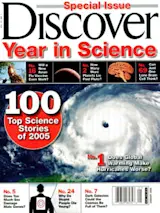Brain Scans Show How Placebos Stop Pain
Need something to dull those nagging aches and pains? Try a placebo.
In a report last August a research team at the University of Michigan measured placebo-related brain chemistry for the first time, moving the effect beyond the realm of subjective observation.
In the study, led by neuroscientist Jon-Kar Zubieta, researchers injected a salt solution into the jaws of 14 men to produce an ache. Each was given a placebo—an injection said to be an experimental pain medication. Nine of the men said the pain subsided.
PET scans turned up differences in brain activity. Those who reported pain relief after taking the placebo showed increased activity in parts of the brain associated with modulating pain. A radioactive tracer also revealed that binding occurred at receptors for naturally occurring pain-fighting endorphins.
"If somebody believes something will work," says Zubieta, "that positive expectation by itself, ...














